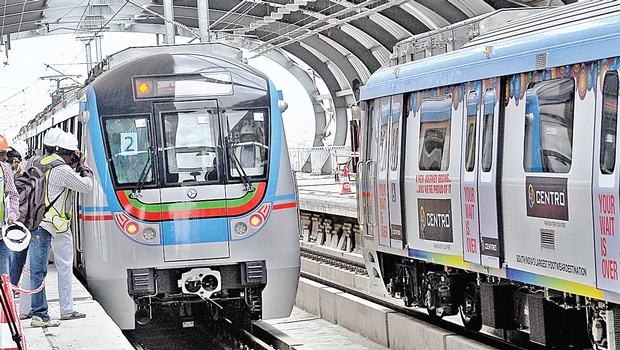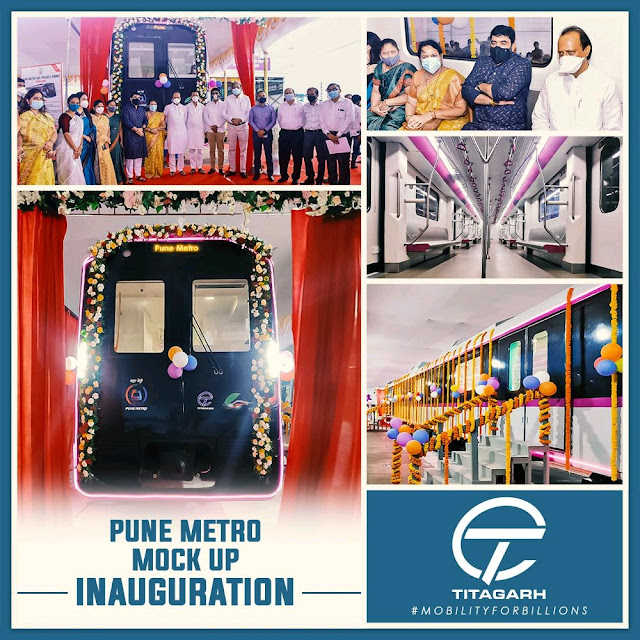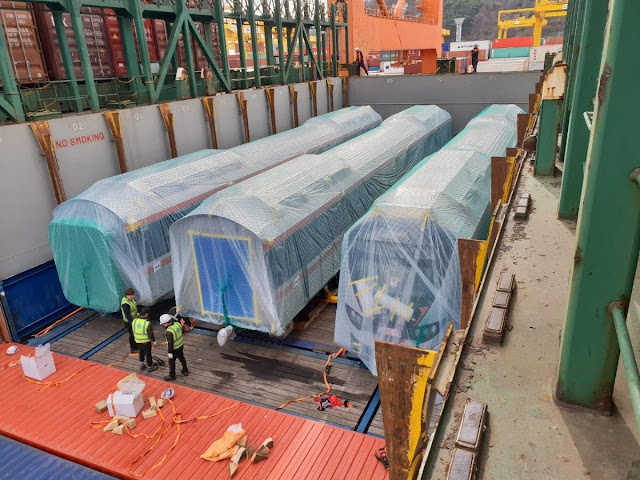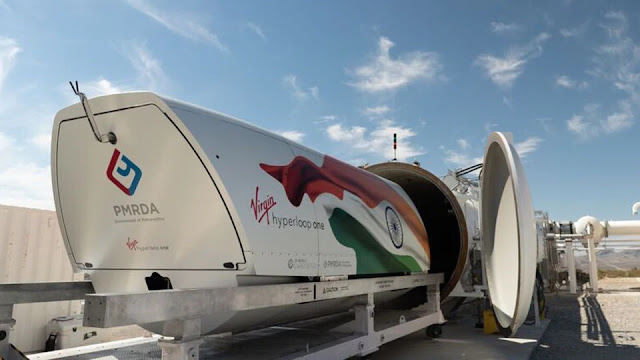The Kolkata Metro or Calcutta Metro (Bengali: কলকাতা মেট্রো) is a metro system serving the city of Kolkata and the districts of South
24 Parganas and North
24 Parganas in the Indian state of West
Bengal. It is the first
Underground metro railway system in India. It was the first such form of
transport in India, opening for commercial services in 1984. It is the 17th
zone of the Indian
Railways system.
Rolling Stock
The rolling stock of Kolkata Metro Line 1 uses Indian
gauge a broad gauge track which is manufactured by ICF,Chennai, and the electrical components are
manufactured by NGEF, Bangalore.
Until now, three types of
trains have been used by Kolkata metro; these are - *BHEL Rake(1000 Series): 9 Rakes were manufactured by ICF, Chennai and were passed into service in the
first phase when the metro initially ran from Esplanade to Bhawanipur (now Netaji Bhavan). These
trains were dark green in colour and had a yellow stripe at the bottom. Later
the colour was changed to white with a dark blue stripe. Presently they are
yellow with a wide brown band at the bottom.
BHEL/Knorr Bremse AC
(3000 Series): These are the latest trains that were passed into service in 2010,
after the elevated corridor from Mahanayak Uttam Kumar to Kavi Nazrul was completed. Later, as
the last extension from Kavi Nazrul to Kavi Subhash was finished, more 3000
Series rakes were introduced. These trains are manufactured by ICF in
collaboration with BHEL and Knorr Bremse,
Germany. They have microprocessor controlled temperature and
humidity, LCD displays inside the motorman's cabins and multilingual electronic
LED sign boards both inside and outside the train. Presently there are 13 (3000
series) rakes, which are operating on Line 1.





Kolkata Metro will get
40 new air-conditioned rakes, the first of which has been delivered to the
public carrier, Metro Railway sources said here.
“Kolkata Metro has
ordered new rakes from Integral Coach Factory (ICF) Perambur, Dalian and CRRC
Zhuzhou of China,” Metro spokesperson Indrani Banerjee told PTI here.
Trial runs soon
The ICF
Perambur-manufactured air-conditioned rake with advanced features that has
arrived in the city, will undergo trial runs before it embarks on passenger
service before Durga Pujas in September, Banerjee said.
The country’s first
metro railway system will get another new rake from ICF in September, which
will be followed by phased arrivals of 38 more rakes.
Apart from the
air-conditioned rake that has already arrived, another 15 have been ordered
from ICF, Perambur, the spokesperson said.
“The city metro will
also start getting delivery of 14 new rakes manufactured by Dalian of China by
the year-end,” Banerjee said. The rest 10 rakes have been ordered from CRRC
Zhuzhou Locomotive Company of China, she said.
These will be supplied by Bharat Earth Movers Limited (BEML). As
per news these rakes will have Bullet Train like features.The brand new coaches
from BEML will be technologically advanced. These will look like bullet train
but made of aluminium instead of steel. All the 14 six coach rakes will have
futuristic features and promises to give a bullet train like feel to commuters.
Delhi Metro
Delhi Metro is a metro system serving Delhi (including New
Delhi and Old
Delhi) and its
satellite cities of Gurgaon, Noida,Faridabad and Ghaziabad in the National Capital Region of India. Delhi Metro is the world's thirteenth
largest metro system in terms of length and a member of Nova Group of Metros. Delhi
Metro is India's third urban mass rapid transport system, after the Kolkata
Metro and Chennai MRTS. It is India's first modern rapid
transit system too.
Rolling Stock
The broad gauge rolling stock is manufactured
by two major suppliers. For the Phase I, the rolling stock was supplied by a
consortium of companies comprising Hyundai
Rotem, Mitsubishi Corporation, and MELCO. The coaches were initially built in
South Korea by ROTEM, then in Bangalore by BEML through a technology transfer arrangement.
Standard Gauge
The standard gauge rolling stock is manufactured by
BEML at its factory in Bangalore.
Airport Express
Eight 6-car trains supplied by CAF Beasain were
imported from Spain.
The first driverless trains, equipped with advanced features, arrived in
Delhi and will ply on sections of the Phase-III network.
The new trains, which will begin service with drivers for a short period,
are expected to be operational by the end of next year.
“A total of 20 such train sets of Hyundai Rotem will be manufactured in
South Korea’s Changwan by the end of this year while the remaining 61 are being
manufactured at the Bharat Earth Movers plant in Bengaluru,” a DMRC statement
said.
“These trains are significantly upgraded and
eco-friendly. They also have additional features to increase passenger comfort
and are designed for a maximum speed of 95 kmph and operational speed of 85
kmph,” an official said. He added though drivers will be deputed for operating
the trains, they will be gradually withdrawn to move to unattended train
operation (UTO). “These new-generation trains are suitable to eventually run on
UTO mode, that is, train operators will not be required to operate these trains
and the Operations Control Centres (OCC) of the Delhi Metro system will
directly regulate the movement of the trains,” the DMRC official said.
Rapid
Metro Rail Gurgaon
Rapid Metro Rail Gurgaon Limited (Raipiḍ Mēţrō Rēl Guḍ.agāṃv) is a metro system in the Indian city of Gurgaon,
Haryana, linked with the Delhi Metro system's Yellow Line at Sikandarpur. Built and operated by
Rapid MetroRail Gurgaon Limited (RMGL), the system is India's first fully
privately financed metro.
The project was initially conceived as a collaborative venture
between real estate developer DLF and Infrastructure Leasing & Financial
Services, or IL&FS. But DLF, facing financial problems, pulled out and
IL&FS became the sole owner. It is the only privately funded public metro
anywhere in the world.
Rolling Stock
On 21 April 2010, Siemens was awarded a turnkey contract to
build the metro line, including five 3-car metro trains. Siemens sub-contracted
CSR Zhuzhou Electric Locomotive Works to build the 5 aluminium-bodied
air-conditioned trains.
Mumbai Metro
Mumbai Metro is a Metro system serving the city of Mumbai, Maharashtra. The system is designed to reduce
traffic congestion in the city, and supplement the overcrowded Mumbai Suburban Railway network. Line 1 of the Mumbai Metro is
operated by Mumbai Metro One Pvt Ltd (MMOPL), a joint venture company formed
by Reliance Infrastructure, Veolia
Transport and the Mumbai
Metropolitan Region Development Authority (MMRDA).
Rolling Stock
RIIL consulted a number of major international rolling stock builders to provide the train fleet for the Mumbai Metro.
Bidders for the contract included established metro-vehicle manufacturers such
as Kawasaki, Alstom, Siemens and Bombardier, but CSR Nanjing of China was ultimately chosen.
BEML was the lowest among Seven Bidders which included 7 Internationally renowned Companies State-of-the-art, driverless trains to be manufactured indigenously by BEML.- supply of trains to begin from Oct 2020 & completed by Dec 2022. BEML bags Contract Purely on Its own Merit - One of the largest orders of Metro Rail Coaches in Recent Times 378 Metro Cars (63 Metro Trains of 6 Cars each) for Mumbai Metro Corridor 2a, 2b & 7 awarded to BEML
Chennai Metro
The Chennai Metro Rail is a rapid
transit system under construction in Chennai, Tamil
Nadu, India. About 55% of the corridors in Phase I
are underground and the remaining corridors are elevated.
Rolling Stock
Alstom won its first metro rolling stock contract in India to
supply 168 cars and 16 additional metro cars to Chennai Metro for €243 million. Alstom will supply Chennai Metro's public operator with 42
train-sets composed of four cars each. Alstom Transport has set up a metro car
manufacturing unit at Sri City SEZ at Tada, Andhra Pradesh, about 75 km
from Chennai.[ The first 9 trains will be made in Lapa, São Paulo, Brazil and the remaining 33 will be made in Sri City.
Hyderabad
Metro
Hyderabad Metro Rail (HMR; Telugu: హైదరాబాద్ మెట్రో రైలు) is a rapid
transit system, currently under construction, for the city of Hyderabad, Telangana. It is in Secent Operational model. It is being implemented entirely
on public-private partnership (PPP) basis, with the state government holding a minority
equity stake.
Rolling Stock
On 12 September 2012, Larsen and Toubro Metro Rail Hyderabad Ltd
(LTMRHL) announced that it has awarded tender for supply of rolling stock to Hyundai Rotem.
Bangalore Metro
Namma Metro (literally
"Our Metro") also known as Bangalore Metro, is a metro system for the city of Bangalore, Karnataka, India. The agency
responsible for its implementation is the Bangalore Metro Rail Corporation Ltd
(BMRCL), a joint venture of the Government of India and the Government of Karnataka.
Rolling Stock
In February 2009, the BEML-led consortium was
awarded the contract to supply 150 coaches and rolling stock for the first
phase of the project. While Mitsubishi would supply the traction for the
coaches, Hyundai Rotem would supply the rolling stock and BEML would supply the
coaches for Phase I.
Kochi Metro
Kochi Metro is an under-construction metro system for the city of Kochi in Kerala,
India.
Rolling Stock
The Rs 5,189-crore Kochi Metro project is the second contract
for Alstom after the Chennai Metro project.
The company will supply 25 sets to Kochi Metro with the first
train expected to be delivered in early 2016.
Lucknow Metro
The Lucknow Metro is an under construction rapid transit system in the city of Lucknow, India. Construction on the first phase began on 27 September 2014. Lucknow Metro Rail Corporation Limited or LMRC is responsible to build and operate this network. The metro project will be the most expensive public transport system in the state of Uttar Pradesh, costing Rs 12500 crore (US$2 billion) in phase 1 of construction which is expected to be operational in 2018. Phase 2 will be started in 2018.
Rolling Stock
On October 5, 2015, French Engineering Firm Alstom bagged over 150 million euro contract to provide train coaches to Lucknow Metro. Lucknow Metro will initially have 20 train sets of 4 car each making a total of 80 cars. The trains will manufactured indigenous at Sricity plant of Alstom India.
Nagpur Metro
Nagpur Metro (Marathi: नागपूर मेट्रो) is an under construction rapid transit system for
the city of Nagpur, India. It is estimated to cost ₹86.80 billion (US$1.4 billion). In February 2014,
the
Government of Maharashtra gave approval for the Metro Project, while
Government of India's Ministry of Urban Development had given "In
Principle" approval for the Project. On 20 August 2014, Union
Cabinet gave approval for the development of project, and
Prime Minister Narendra Modi laid
foundation stone on 21 August on his visit to city. Construction on
the project began on 31 May 2015, with trial run expected by the
mid of 2017 and an anticipated partial commercial operation on line 1 in 2018.
Rolling Stock
China Railway Rolling Stock Corporation (CRRC) has bagged the contract for the supply of 69 coaches to the Nagpur
Metro, by beating BEML and Titagarh Wagon.
Pune Metro
Rolling Stock
In August 2019, Mahametro announced that Titagarh Firema had won the bid to supply 102 aluminium bodied coaches for the project.
Jaipur Metro
The Jaipur Metro (Hindi: जयपुर मेट्रो Jaipur Metro) is a rapid transit system under construction in the city of Jaipur, Rajasthan, India.
Construction of the first part of the first line, comprising 9.2 kilometres
(5.7 mi) from Mansarovar to Chandpole Bazaar, started on 13 November 2010. The
Jaipur Metro Rail system is expected to be India's
fifth metro rail system after those in Kolkata, Delhi-Ghaziabad-Gurgaon-Noida(NCR), Mumbai and Bangalore.

Rolling Stock
In December 2011 BEML was awarded a Rs 3.18 billion contract
to supply 10 four-car trains for Phase 1. The Jaipur Metro plans to lengthen
the trains later to 6 coaches as the traffic increases. The Jaipur metro rolling stock is same
as Delhi metro's standard gauge rolling stock on current violet line and green
lines.
Ahmedabad Metro
Metro-Link Express for Gandhinagar and Ahmedabad, abbreviated MEGA, or Ahmedabad Metro is an under construction mass-transit rail system for the cities of Ahmedabad and Gandhinagar in Gujarat, India.
Rolling Stock:
Hyundai Rotem will provide the metro coaches.
Noida Metro
The Noida Metro is an under-construction metro system connecting the twin cities of Noida and Greater Noida in Uttar Pradesh, India. The metro network consists of one colour-coded line, with a total length of 29.7 kilometres serving 22 stations. The system has a mix of at-grade and elevated stations using standard-gauge tracks. Services will operate daily with a headway varying between 5–10 minutes. The trains will be composed of four cars. The power input is supplied by 25kV AC (Single Phase 50 Hz).
Rolling Stock
The metro uses lightweight rakes made of stainless steel and aluminium, manufactured by China's CRRC Corporation. Each train has a seating capacity of 186 and a standing capacity of 848, with total capacity of 1,034 passengers. Nineteen rakes with four coaches each, a total of 76 coaches, will operate of the Aqua Line. The cost of each coach is ₹4 crore (US$610,000). Trains are equipped with a passenger information system, a public address system and an emergency announcement system from the operation control centre.
Mumbai Monorail
The Mumbai Monorail is
a monorail system in the city of Mumbai,
India, part of a major expansion of public
transport in the city. The project was implemented by the Mumbai
Metropolitan Region Development Authority (MMRDA), along with a consortium of Mumbai-based conglomerate Larsen & Toubro and the Malaysian infrastructure firm Scomi
Engineering Bhd. It is the first monorail in India since the Kundala
Valley Railway and Patiala
State Monorail Trainways were closed in the 1920s.
Rolling Stock
The monorail cars were built in Malaysia by Scomi Rail Bhd.
The first car was shipped to India on 2 January 2010, marking the first time
that rail cars manufactured by the company were exported overseas.
Six trains currently operate in the first phase of the line.
Calcutta Tram
The Kolkata tram is
a tram system in Kolkata, India,
run by the Calcutta
Tramways Company (CTC). It is currently the only operating
tram network in India and the oldest operating electric tram in Asia,
running since 1902.
Rolling Stock
There are several types of rolling
stock:
·
Old SLC Type – The first double-coach tram with
wheels between the coaches, manufactured at the Nonapukur workshop.
·
SLC Type – This modified variation has a
pivot, and is less stylish than articulated trams; it is also manufactured at
Nonapukur. The only differences is that its front and back are straight, not
slanted.
Articulated tram
·
Articulated SLC Type – This is a
slightly less-stylish variation of the articulated tram, also manufactured at
Nonapukur. The only difference is that its front and back are overhanging, and
narrow towards the ends. It also had an improved engine, but was suitable for
local routes.
·
Renovated SLC Type – After many years
of SLC and articulated trams a new type of rolling stock arrived in Kolkata,
made by Burn Standard India Limited. It is stronger,
heavier and faster than earlier designs. Some trams were partly modified with
front glass; two were modified to resemble Melbourne's B-class trams, with fluorescent lights, back
glass and double ends. These are the most common trams in Kolkata.
·
New Cars – Before the introduction of the
single-bogie tram in December 2012, this was the last new rolling stock, built
by Jessop India Limited and a variation of
the pivot type, introduced about 1984.
·
Single-Bogie Type – Currently this is the latest new
rolling stock, one of which has been running since 24 December 2012. These trams
are claimed to be faster and more manoeuvrable than the current double-bogie
trams with the carriage being longer than the carriages in the double bogie
trams.
Virgin Hyperloop One said Maharashtra's nod to form a consortium of DP World and Hyperloop Technologies for its maiden project to connect Mumbai with Pune is the first of the many key steps towards bringing the new transportation technology to the masses.
Hyperloop is an ultramodern, superfast transport project to link Mumbai and Pune, located around 200 km apart, shrinking travel time to around 25 minutes from the present three hours.
The Maharashtra government had on Tuesday given the infrastructure status to the Mumbai-Pune hyperloop project that seeks to reduce the travel time between the two cities to just 23 minutes. It also approved formation of a consortium of DP World FZE and Hyperloop Technologies as proponents of the original project.
DP World, a global trade leader and a major ports and logistics operator in the country, is set to invest $500 million in private capital to complete Phase I of the project, which will certify this new technology for passenger operations, establishing India as the epicentre of hyperloop innovation without using public funds, the release stated.
"Once commercialised, it will transform the Pune- Mumbai corridor into a mega-economic region moving people and cargo between these two centers in a cost-effective and sustainable manner.
Harj Dhaliwal, Virgin HyperloopOne managing director for India and Middle East, said, "This process creates a blueprint for a hyperloop network spanning the entire nation."
The FDI in the entire project, which will take seven years for completion, is to the tune of Rs 70,000 crore, as per the government.
In the first phase, the project will be run on a pilot basis for 11.8 km in the Pune metropolitan region at a cost of Rs 5,000 crore, the government statement said.
The hyperloop train will run from BKC in Mumbai to Wakadin in Pune, covering a distance of 117.5 km, at a speed of 496 kmph and cover the distance in just 23 minutes.
---xxx---
2020/2021
Updates
Kanpur Metro
Kanpur
Metro is a rail-based mass transit system which is under
construction for the city of Kanpur, India, and extendable to
the Kanpur metropolitan area.
Rolling Stock
Canadian multinational firm
Bombardier Transportation emerged as the lowest bidder (L1) for providing 201
coaches (rolling stock) and signalling & train-control system for Phase 1 of Kanpur and Agra Metro Rail project.
Agra Metro
The Agra Metro is a proposed rapid transit network in Agra, the fourth
largest city in the Indian state of Uttar Pradesh. The feasibility
study was conducted in 2016, with the government approving the project in early
2019. The Agra Metro is set to consist of two metro lines, with a total length
of about 30 kilometres (19 mi).
Rolling Stock
Canadian multinational firm
Bombardier Transportation emerged as the lowest bidder (L1) for providing 201
coaches (rolling stock) and signaling & train-control system for Phase 1 of Kanpur and Agra Metro Rail project.
Meerut Metro
The Meerut
Metro is an under-construction rapid transit system,
which will serve the city of Meerut, Uttar Pradesh, India.
It is being built in two phases, out of which the first phase with the first
line will cover 23.6 km (14.7 mi) with 13 stations, from Modipuram to Meerut South.
Rolling Stock
In 2020, Alstom was awarded the contract, and
the scope of work includes:
Design, build, and deliver the trainsets -
30 transit train cars
Design, supply and install the signaling,
train control and telecommunication system, platform screen door &
long-term evolution which is completed for the ~ 17km priority section for
the launch
Provide comprehensive maintenance services
for 15 years
Bhopal Metro
The Bhoj Metro (also known as the Bhopal Metro) is an under construction rapid transit system intended to serve the city of Bhopal, India, the capital of the Indian state of Madhya Pradesh. The total system consists of 6 corridors covering a distance of 104.87 kilometers (65.16 mi).
Rolling Stock
Alstom, has been awarded the contract by Madhya Pradesh Metro Rail Corporation Limited (MPMRCL) to deliver 156 Movia metro cars with 15 years of comprehensive maintenance for the Bhopal and Indore metro projects.
Delhi–Meerut RRTS
Delhi–Meerut
Regional Rapid Transit System (Delhi–Meerut RRTS) is an
82.15 km long, under-construction, semi-high speed rail corridor
connecting Delhi-Ghaziabad-Meerut. It is one of the
three rapid-rail corridors planned under Phase-I of Regional Rapid Transport
System (RRTS) project of National Capital Region Transport Corporation (NCRTC). With maximum speed of 160 km/h
(99.42 mph), the distance between Delhi and Meerut will be covered in
around 62 min (1.03 h).
Rolling Stock
On May 1, 2020 Bombardier Transportation emerged as the lowest bidder among a group of 3 bidders
to supply and maintain 210 coaches.
BOMBARDIER TRANSPORT HAS BEEN BOUGHT BY ALSTOM.
Office of ABB/Bombardier Transportation
Pic Courtesy: Olaf Bautze (Project GP 140), Bombardier Zurich, Switzerland
---xxx---
























.jpg)





























































































.jpg)




.jpg)
.jpg)
.jpg)
.jpg)

The page keeps on updating as new metro projects are introduced in India. So stay tuned!!!
ReplyDeleteRegards
Sundar Mukherjee